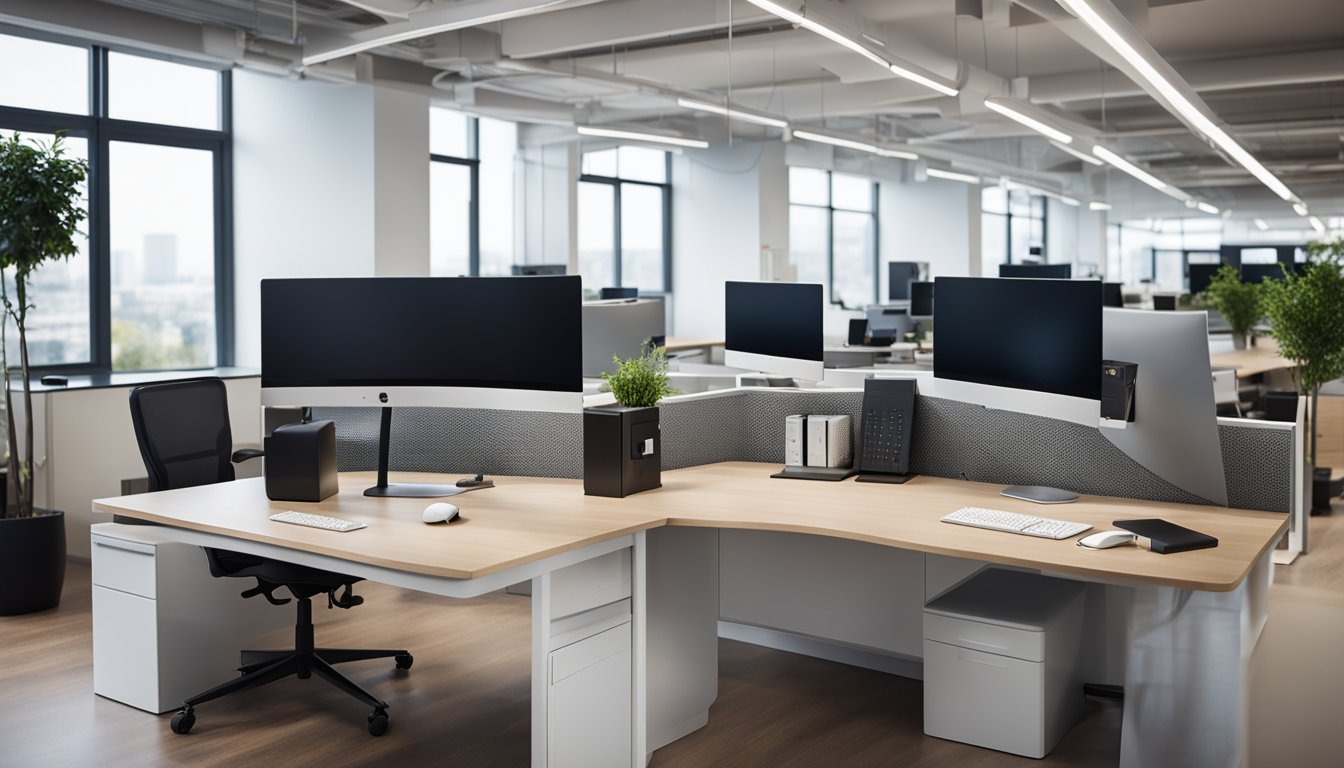Late updated: 11 Jan 2025 15:01
Written by: Amber Collins
Smart Office Solutions For UK Small Businesses: Enhancing Productivity and Efficiency
In today's technology-driven world, small businesses in the UK stand at the forefront of a remarkable transformation, embracing smart office solutions to enhance productivity and collaboration. By integrating advanced technologies like AI and IoT, organisations are optimising their workspaces to support the hybrid working model. Innovative smart office solutions are proving to be indispensable, providing effective ways to manage resources and boost productivity without the need for extensive physical space.

Our exploration into this exciting realm reveals how these technologies benefit small businesses. From Meraki Wi-Fi systems for seamless connectivity to smart building automation that enhances security, the tools available are both diverse and dynamic. These advancements not only empower employees but also offer insights into better resource management, creating an agile workspace that's adaptable to varying demands.
The shift is not only technological but strategic, allowing small businesses to optimise their operations to meet the modern demands of a distributed workforce. As we delve into the specifics, it's clear that adopting these solutions can offer a significant competitive edge. With the right combination of smart tools, businesses can create an efficient, collaborative environment conducive to growth.
Key Takeaways
- Smart office solutions boost productivity for UK small businesses.
- Innovative technologies like AI enhance hybrid working spaces.
- Adopting smart tools offers a competitive advantage.
Innovations in Smart Office Technology
In our exploration of smart office solutions, we recognise the transformative impact of IoT and AI, the importance of robust security systems, the role of automation in enhancing operational efficiency, and the potential of advanced analytics in boosting productivity.
Harnessing IoT and AI for Enhanced Operations
The convergence of Internet of Things (IoT) and Artificial Intelligence (AI) is reshaping how we manage office environments. IoT-enabled sensors facilitate real-time data collection, allowing us to monitor everything from energy usage to equipment performance. AI-driven algorithms then analyse this data to predict maintenance needs and optimise resource allocation, enhancing operational efficiency.
Moreover, smart office systems utilise AI to streamline communication and coordination. This includes automating routine tasks such as meeting scheduling and facility management. By integrating IoT and AI, smart offices create a responsive environment, adjusting elements like lighting and temperature based on occupancy levels. The result is a dynamic workspace that continually adapts to user needs, significantly improving the working experience and reducing operational costs.
Elevating Security Through Intelligent Systems
In today’s digitised world, security within smart offices is a paramount concern. We leverage intelligent security systems that combine AI and IoT for comprehensive cybersecurity measures. These systems include advanced access control solutions, utilising biometric data and real-time monitoring to prevent unauthorised access.
Our smart office software employs machine learning to detect anomalies, providing early warnings of potential threats. This proactive approach to risk management enhances our ability to safeguard sensitive information and maintain business continuity. Furthermore, AI-powered systems can dynamically adjust security protocols based on perceived risk levels, ensuring that security measures are both robust and flexible.
Automating Efficiency with Smart Solutions
Automation is at the core of smart office innovations. By implementing smart solutions, we achieve efficiency gains across multiple facets of office operations. Task automation software handles repetitive processes such as data entry, freeing up human resources for more strategic initiatives.
Additionally, smart office systems optimally manage energy consumption through automated lighting and HVAC systems. These systems adjust their operations in response to real-time occupancy data, significantly reducing energy costs. Automation extends to inventory management as well, with IoT-based tracking ensuring resources are replenished without manual intervention. The result is a streamlined operation that reduces waste and boosts productivity.
Realising Productivity Gains with Advanced Analytics
Advanced analytics provide us with actionable insights that drive productivity improvements. By harnessing big data, we can offer data-driven decision-making capabilities that refine business strategies and operational tactics. These insights come from analysing patterns in daily office activities and employee interactions.
Predictive analytics empower us to anticipate operational challenges and allocate resources efficiently. Smart office analytics also reveal bottlenecks and inefficiencies, allowing us to optimise workflow processes. This creates an environment where we can adapt swiftly to changing demands, ultimately supporting a more productive and engaging workplace. Through detailed analysis, our smart offices continually evolve, ensuring sustained growth and innovation.
Optimising the Hybrid Working Environment

To fully leverage the hybrid work model, we need to integrate smart technologies and innovative strategies. By focusing on digital solutions, employee well-being, sustainable practices, and enhanced connectivity, we can revolutionise current workspaces.
Integrating Digital Workplace Strategies
Integrating digital workplace strategies is crucial to optimising hybrid work. We can enhance productivity using cloud technologies like Microsoft 365, enabling seamless collaboration across locations. Tools such as interactive whiteboards facilitate dynamic meetings, bridging the gap between remote and on-site teams. Additionally, advanced desk booking and space utilisation systems ensure efficient use of office space. Smart scheduling tools help manage employee attendance, allowing a smooth transition between remote and physical workplaces. Occupancy sensors collect real-time data on office use, facilitating informed decision-making and future-proofing work environments.
Advancing Employee Well-Being with Smart Workspaces
Prioritising employee well-being is essential in smart workspaces. Incorporating solutions like ergonomic furniture and ambient lighting improves the physical work environment. Smart air quality monitors ensure a healthy atmosphere, while temperature controls allow personal comfort adjustments. Thoughtfully designed spaces promote both focus and relaxation, enhancing the employee experience. Integrating technologies that support flexible scheduling accommodates diverse working styles, reducing stress and boosting satisfaction. Regular feedback loops help us refine these initiatives, ensuring our teams remain motivated and engaged.
Sustainable Solutions for a Smaller Carbon Footprint
Hybrid work offers opportunities for sustainability by reducing the need for daily commuting. Digital workspace solutions also cut down on paper use, especially when paired with smart print management systems that limit waste. Implementing energy-efficient lighting and appliances, alongside occupancy sensors, further lowers our carbon footprint. By investing in renewable energy sources for office operations, we contribute positively to environmental goals. Encouraging remote work days helps in minimising the total energy consumption, supporting a greener workplace model.
Enhancing Collaboration and Connectivity
Enhancing collaboration and connectivity in hybrid environments requires innovative tools and approaches. Collaboration tools like Slack, Microsoft Teams, and Zoom provide seamless communication channels, making remote interactions as natural as face-to-face ones. Investing in high-speed internet and reliable networks ensures uninterrupted connectivity. Shared digital platforms and cloud-based applications allow simultaneous collaboration on projects, fostering a unified team effort. Smart technologies integrated into workspaces create intuitive and responsive environments, enriching our collaborative efforts and ensuring efficient workflow.
Frequently Asked Questions

As small businesses in the UK embark on the journey of integrating smart office solutions, they often encounter questions around efficiency, costs, and the impact on productivity. We address these queries to help navigate the successful implementation of technology in the workplace.
How can smart office technology improve efficiency for UK small businesses?
Smart office technology streamlines daily operations through automation and integration. By adopting tools like smart lighting, climate control, and scheduling systems, businesses can reduce manual tasks and minimise downtime. This leads to more efficient use of resources and better time management, creating a more responsive and dynamic working environment.
What are the essential components of a smart office system for a small enterprise?
Key elements include devices like smart lighting, automated climate control, advanced security systems, and integrated communication platforms. These components work together to create a cohesive and efficient environment. Cloud services and IoT devices are also important, enabling seamless data sharing and remote access to business systems.
What are the common challenges faced when implementing smart office solutions in small businesses?
Some challenges include the initial cost of technology investment, employee training, and integration with existing systems. Additionally, ensuring security and data privacy can be complex. It's crucial for businesses to plan thoroughly and choose technology that aligns with their specific needs and capabilities to mitigate these challenges.
How does integrating smart office systems impact the cost management for small businesses in the UK?
While the upfront investment can be significant, the long-term benefits often outweigh initial costs. Smart systems can reduce energy consumption, lower utility bills, and offer more effective resource allocation. Over time, these cost savings can positively impact a business’s bottom line, making the investment worthwhile.
In what ways can smart office solutions enhance employee productivity in UK small businesses?
Smart solutions facilitate better communication and collaboration through tools like virtual meeting platforms and shared cloud spaces. Automation allows employees to focus on higher-value tasks rather than administrative functions, boosting productivity. Improved environmental controls ensure a comfortable workspace, contributing to higher employee satisfaction and efficiency.
What considerations should UK small business owners make when choosing a smart office provider?
Owners should evaluate the provider's experience, technology offerings, and support services. It's important to ensure the solutions offered are scalable and compatible with current systems. Customer service quality and implementation support are also crucial factors, as these will affect the ease of transition and long-term success of the smart office transformation.
